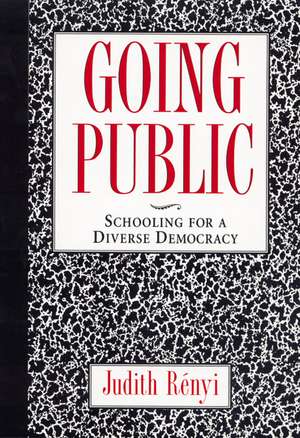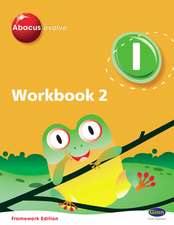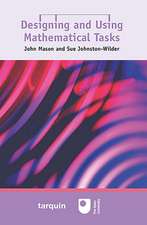Going Public: Schooling for a Diverse Democracy
Autor Judith Renyien Limba Engleză Hardback – 31 ian 1994
By undertaking to educate every single American child all the way through high school, the United States has set for itself a goal unrivaled by any other country in the world. But this goal has run full tilt into a heated debate about what we teach diverse children about our history, language, and literature.
Arguments for and against multicultural education, according to Judith Renyi, Director of Collaboratives for Humanities and Arts Teaching (CHART), have too often been debated in a historical vacuum. Going Public is an unprecedented attempt to provide the historical context of the struggle for diverse curricula in American public schools. It also interprets the teachings of our schools in surprising ways.
Dr. Renyi offers an eloquent and wide-ranging look at how our educational goals have changed over the past century, as well as a prescription for how they must continue to change through the millennium if we are to accomplish the ambitious task of fully educating the poorest quarter of our nation. She also provides perhaps the most informed overview to date of the multicultural education debate—of the formation and reformation of the canon, the call for a return to basics, and the politics of inclusion. She ends with a powerful argument for a generous, diverse curriculum that reflects our radical national experiment in educating all our citizens through high school—for changing the “what” and “how” of education to engage the new “whom.”
With erudition and sensitivity—combined with firsthand knowledge from visits to hundreds of elementary and secondary school classrooms across the country—Renyi offers historical perspective as well as humane solutions.
Arguments for and against multicultural education, according to Judith Renyi, Director of Collaboratives for Humanities and Arts Teaching (CHART), have too often been debated in a historical vacuum. Going Public is an unprecedented attempt to provide the historical context of the struggle for diverse curricula in American public schools. It also interprets the teachings of our schools in surprising ways.
Dr. Renyi offers an eloquent and wide-ranging look at how our educational goals have changed over the past century, as well as a prescription for how they must continue to change through the millennium if we are to accomplish the ambitious task of fully educating the poorest quarter of our nation. She also provides perhaps the most informed overview to date of the multicultural education debate—of the formation and reformation of the canon, the call for a return to basics, and the politics of inclusion. She ends with a powerful argument for a generous, diverse curriculum that reflects our radical national experiment in educating all our citizens through high school—for changing the “what” and “how” of education to engage the new “whom.”
With erudition and sensitivity—combined with firsthand knowledge from visits to hundreds of elementary and secondary school classrooms across the country—Renyi offers historical perspective as well as humane solutions.
Preț: 143.31 lei
Nou
Puncte Express: 215
Preț estimativ în valută:
27.42€ • 28.63$ • 22.64£
27.42€ • 28.63$ • 22.64£
Carte disponibilă
Livrare economică 25 martie-08 aprilie
Preluare comenzi: 021 569.72.76
Specificații
ISBN-13: 9781565840836
ISBN-10: 1565840836
Pagini: 304
Dimensiuni: 164 x 243 x 27 mm
Greutate: 0.54 kg
Editura: New Press
Colecția The New Press
ISBN-10: 1565840836
Pagini: 304
Dimensiuni: 164 x 243 x 27 mm
Greutate: 0.54 kg
Editura: New Press
Colecția The New Press
Notă biografică
As the Director of CHART (Collaboratives for Humanities and Arts Teaching), Judith Renyi has spent the last ten years helping teachers and schools across the country implement new multicultural curricula specifically designed to engage and empower our most impoverished students.
Descriere
"Brave and long overdue. . . . A thoughtful and historically grounded critique of US traditions in curriculum and teaching which brings seriousness and sympathy to a debate that often lacks both qualities. This is thinking for a new world and a new century".--Jay Featherstone, Professor of Education, Michigan State University.






